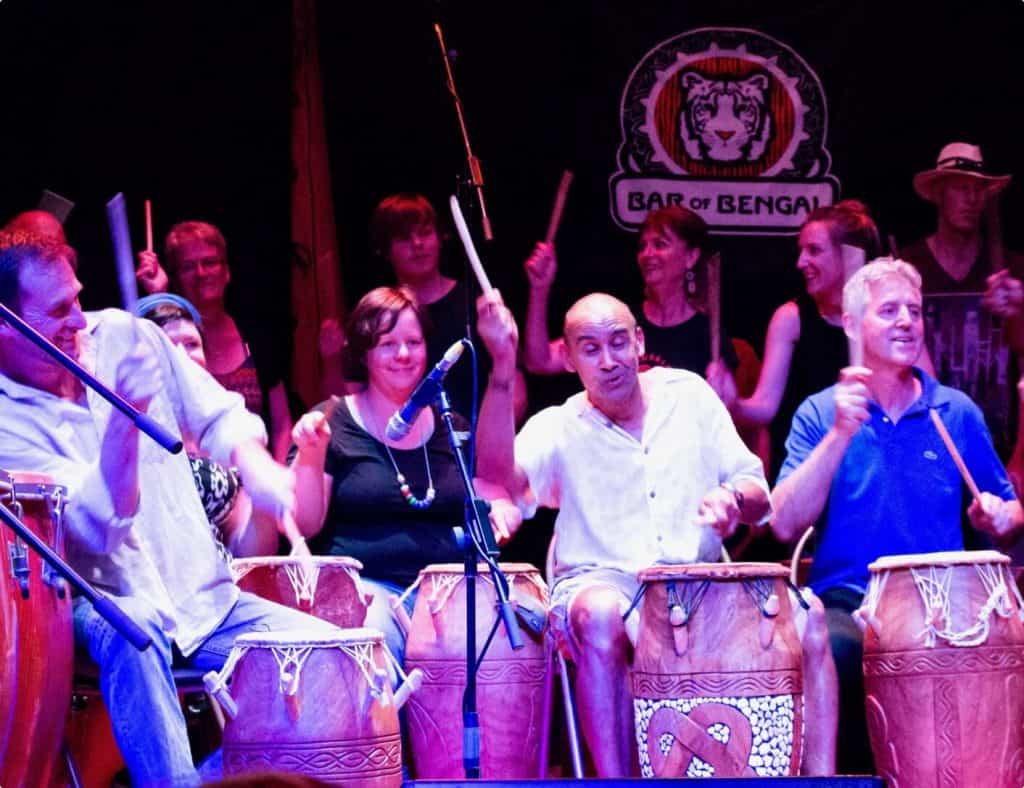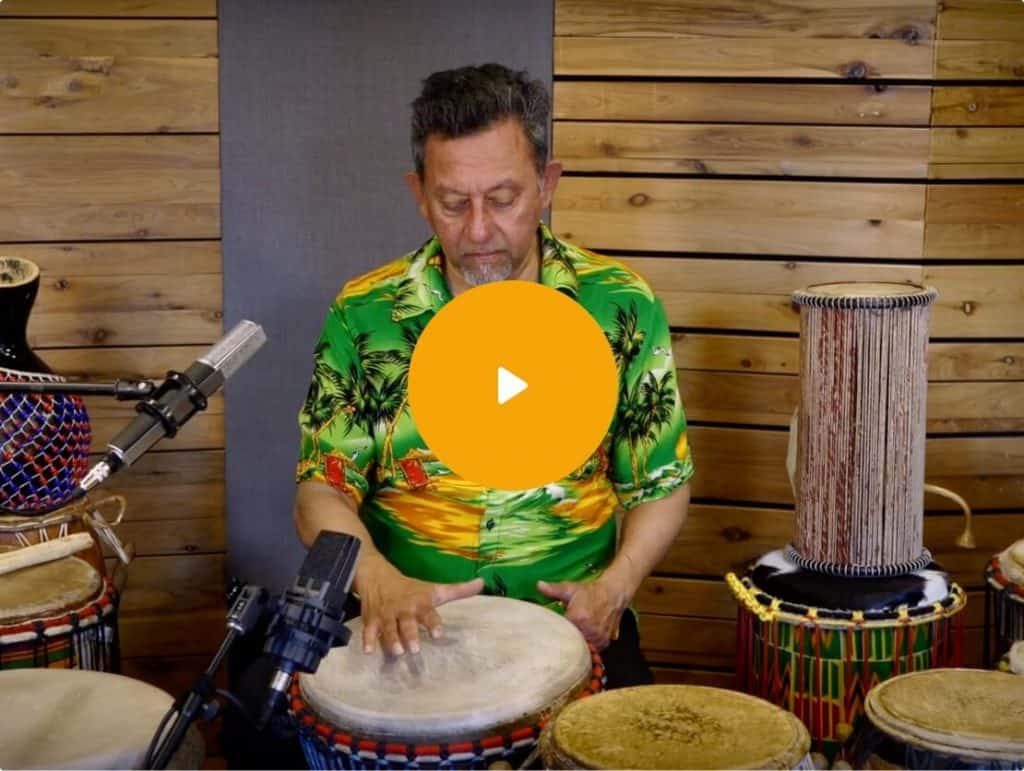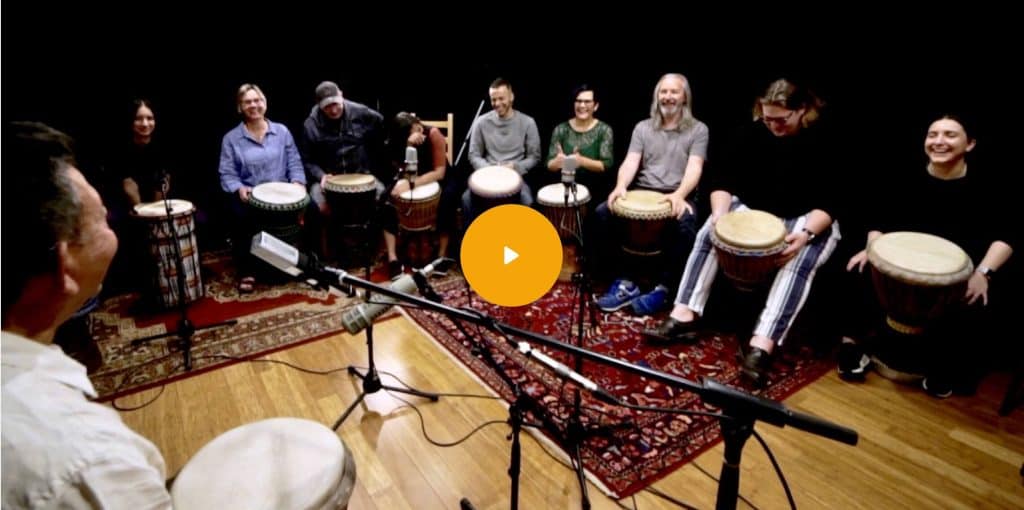African Drumming Classes
Bookings now open for 2025.Classes start January 7th.Please register now by email. Costs include access to video content of material taught and supply of drum.

Ray’s African Drumming Classes in Melbourne are presented as courses that run over four consecutive weeks.
Your teachers will show you how to get good sounds from the drum, how to listen to the rhythms and to experience the joy of making music and playing with other people in a group.
Ray’s African Drumming classes are a supportive and fun environment where you can really challenge yourself.
Weekly classes are held in Footscray, Brunswick and Fitzroy/Northcote. Costs are $120/$100 conc. for 4 week course.
What can you expect from African Drumming classes with Ray?
- High quality, personalised teaching with individual feedback
- Learn great technique on a range of percussion instruments
- Learn how to hear, play and feel rhythms
- Learn a number of West African and Afro Cuban rhythms and their accompanying parts
- Experience of how rhythms relate to dance and songs
- Many opportunities to learn, perform and extend yourself at your own pace
- Ray’s technical expertise and 30 yrs of experience in different genres of music
- Classes delivered by expert teachers under Ray’s supervision
- Very reasonable prices
Benefits for students:
- Learn from one of Australia’s most experienced and respected musicians
- Have fun learning in a non competitive environment
- Challenge yourself to improve and learn more about the African Drumming rhythms, songs and culture of the music being played
- Aim to step up to an intermediate class as you improve and gain more experience
CLASS LOCATIONS AND TIMES
Costs are $120/$100 conc. for a 4 week course.
Footscray
African Dance Classes – Footscray
2025 Next Course Starts
Wednesday July 23
Wednesday nights 8pm to 9.30pm
Location: Kindred Studios
3 Harris St Yarraville
Intermediate African Drumming Classes – Footscray
2025 Next Course Starts –Wednesday July 23
Wednesday nights 6.30pm – 7.45pm
Location:Kindred Studios3 Harris St Yarraville
Advanced African Drumming Classes – Footscray/Yarraville
2025 -Next Course Starts –Tuesday July 22
Tuesday nights 8pm to 9.15
Location: Kindred Studios, Cnr Harris / Whitehall St, Yarraville, Vic
Beginner African Drumming Classes – Footscray/Yarraville
2025 Next Course Starts Tues July 22
Tuesday Nights 6.30- 7.30 Location: Kindred Studios, Cnr Harris / Whitehall St, Yarraville
Fitzroy
Intermediate African Drumming Classes – Fitzroy/Northcote/Brunswick
2025 Next Course Starts
Monday July 21
Monday nights 8pm to 9pm
Location: Uniting Church Merri St Brunswick.
Beginner African Drumming Classes – Fitzroy/Northcote/Brunswick
2025 Next Course
Starts – Monday July 21
Monday nights 6:30pm to 7:45pm
Location: Uniting Church Merri St Brunswick (Just off Sydney Rd near the Town Hall.
Brunswick
Intermediate African Drumming Classes – Brunswick
- 2025 Next Course – Thursday July 24
Thursday’s 6.30 to 7.45
Location: Meri Bek Band Hall,16-22 Cross Street, Brunswick (Next door to Brunswick Bowling Club)
…
Intermediate African Drumming Classes – BrunswickRead More »
Beginner African Drumming Classes – Brunswick
- 2025 Next Course – Thursday July 24
Thursday’s 8 pm -9.15 pm
Location: Meri Bek Band Hall,16-22 Cross Street, Brunswick (Next door to Brunswick Bowling Club)
Classes
Beginner
Beginner classes are for new people who want to try out African Drumming for the first time and for those who may have played a few times before. There is no need for previous experience and you don’t need a drum.
Ray will guide you through the basics of African drumming and show you how to get good sounds from the drums. You will enjoy learning about African Drumming, African Drumming rhythms and enjoy playing these rhythms with other people in a small group. You will be pleasantly surprised at how quickly you can improve under Ray’s expert guidance.
Intermediate
Intermediate African Drumming Classes are tailored to suit those students who have had some prior drumming experience.
Generally speaking, most Intermediate students have already done a few courses in Ray’s Beginner Classes, but if you have had some drumming elsewhere and want to join Ray’s Intermediate class then it’s best to call Ray and discuss this with him first. Ray will be able to then suggest a class that best suits you
Advanced
The advanced classes assume that you have had several years drumming experience and have a good knowledge of African Drumming and Rhythms.
All Ray’s current advanced students have been studying with Ray for a few years and are then invited to join his advanced class. If you have drummed elsewhere but still want to join Ray’s advanced group then call Ray to discuss this first.
Children
Call Ray to discuss options if you want your child to do African Drumming with Ray.
Ray runs school holiday programs for children and also runs regular classes from time to time. If your child wants to join one of Ray’s regular adult classes then that may be possible depending on the age of your child, their experience and also their maturity.
Master classes
Ray also runs master classes for professional musicians and music students at universities and music colleges. He can tailor a session to suit your requirements – please contact Ray for more details.
Frequently asked questions
There is no expectation of any prior musical experience. If however, you have a musical background, Ray will be able to adapt his teaching to your existing knowledge and skills. You don’t need to have any African drumming experience either.
New can be exciting and stimulating. It can also be scary and intimidating. Ray knows this, and uses a mix of generous encouragement and praise and humour to diffuse any uneasiness you may feel in trying out African drumming. But, if you do have previous experience in African drumming, Ray will adapt his teaching to accommodate your existing skills and ensure you are still being challenged. Once you are ready, you can progress to the intermediate classes.
Good rhythm is not an absolute necessity. Most people do have rhythm but have never been shown how to find it. Part of what you’ll learn in these African Drumming classes with Ray is rhythm and how to find it. Ray breaks down the African Drumming rhythms to the most basic level, so you’ll be able to find your sense of rhythm!
Ray’s African Drumming Classes are run in Melbourne as Courses that run over four consecutive weeks. Classes run all year with one course following another. New students join at the start of each course and then book in for subsequent courses at the end of each four week block if they want to continue.
Classes are run in small groups, which vary in size depending on the number of bookings.
A beginner class may have only new people starting for the first time or may have a combination of new beginners and people who have attended a few courses but are still beginners. Ray is an experienced teacher who is able to manage the different levels of experience and ability of people in the class. Each participant works at their own pace but is still able to fit into the group and progress with the group.
All new students start off in a Beginner Class where they learn the basic technique on how to play the African Drums including the Djembe Drum and Dun Dun Drums. Ray will teach you how to get good sounds from the drum and how to play a variety of rhythms on the drum.
African Drumming Rhythms are polyrhythmic which means that each rhythm you learn has several parts being played together at the same time.
A typical rhythm may have up to three Djembe Drum parts and three Dun Dun Drum parts plus Cowbells and Shakers added to the Drums.
Ray will go through all the parts separately showing you the sounds that make up each part and how to play the part correctly.
This process may take a complete four week course or even more than one course until Ray feels that the rhythm is being played correctly and sounds good.
At the end of a four week course those who want to continue can then book for the next course.
Depending on how many continue and how many new people join Ray may start off the next course with a new rhythm and revise the parts from the previous rhythm. Either way you will be learning new material and revising and consolidating what you have already learnt. New students will then learn the new rhythm and catch up on previously learnt material as classes continue.
As you continue with classes Ray will make sure your technique on the drum gets better and the quality of your sounds improves.
When Ray thinks you are ready to move up from a Beginner class you will be invited to join an Intermediate class with more experienced players.
If you have already played before and have had some experience you can discuss with Ray which class will be the most suitable for you to join. This will depend on the repertoire you have learnt and your experience, knowledge and ability.
Ray wants all his students to feel comfortable in the class and not feel either out of their depth or too advanced for the class. Ray is experienced at assessing what class you should join and will advise you as to what is best for you.
A drum can be provided for use in beginner classes at no extra charge if you need one. Please contact your teacher in advance if this is the case. If you have a drum then bring it along to the class if you can.
Students are welcome to make audiovisual recordings of the classes to aid their private study only. Written material is also delivered as part of the course. You need to get permission from Ray before you share this material or copy it.
Cost of all 4 week courses is $120/$100 concession. Payment for each 4 week course is made in advance. Eg: If you want to enroll for the course, payment is made at the first class. The same system is then repeated if you continue with subsequent courses.
If you are sick then you can make up a class that you miss. If you know you are away for a lesson before the course starts and let Ray know before the first class of the course then you don’t need to pay for that lesson. Otherwise the whole course is paid for at the first class.
"I started drumming with Ray in Feb 2019, and have been looking forward to the Tuesday evening classes since then.
He balances between challenging us with new rhythms and also helps us to learn by breaking it down to parts that are easy to pick up.
Ray has a wicked sense of humour so there’s never a dull moment. He also takes a moment during classes wow us with his drumming mastery, which is always a treat!
What’s really special is that he’s a top human being who uses his art and generosity to bring people together in his gigs for students, while also helping out families in Sri Lanka and Ghana. So glad to have crossed paths with him!"
He's a cool guy – funny, encouraging – and is really attentive to the technique of each individual.
I've learned so much from him already and it's only been a couple of months. Highly recommended teacher, I feel very lucky to be learning with him."
"Joining Ray’s drumming class has been one of the best things I have ever done for myself. Over the past year the Brunswick drumming class has become an important part of my week.
Ray’s passion for teaching and his mastery of rhythm, along with that of his teaching staff, is truly inspirational.
Not only has he helped build confidence in my evolving drumming skills, but a confidence that extends to the rest of my life. Thank you Ray for creating such a special community, a feeling of camaraderie, that I am honoured to be a part of."
"I had a good friend ask me to attend his drumming concert last year. I was excited to attend the concert to see how he was doing in his classes. I was so blown away when I saw the concert. Turns out this teacher Ray doesn't just teach djembe classes, looks like he fosters a community of people to share with themselves and others through rhythm and dance.
I was so happy seeing everyone perform I just couldn't stop smiling. I thought, this Ray guy, I want to learn from him too. So I signed up for his drum classes the following year.
Turns out I was right, Ray is a master teacher of djembe and rhythms, but he's also a master of letting you know how to see the most within yourself and having confidence to improve. Not just with the drum, but also within yourself.
A great mentor with a big heart. You can tell a great teacher by the community they foster and love, with patience and sharing. I found mine."
"If you're a music lover this is the drumming class for you.
You won't just cover African rhythms and techniques, you'll also touch on Sri Lankan, Cuban, Brazilian and more. Great teachers and supportive groups."
"I've been drumming here for a few months now. The classes are great, we learn a lot about music from different parts of (mostly West) Africa and play the djembe as well as other African percussion instruments.
Ray is a very experienced and knowledgeable teacher and there's a great group of students too. We always have fun in our classes.

